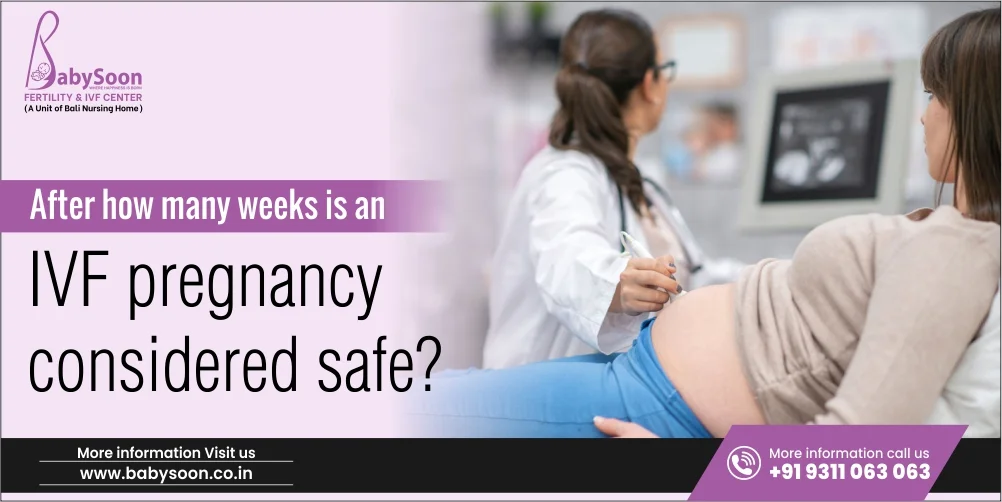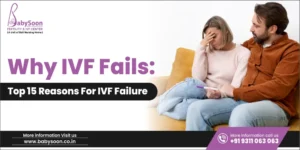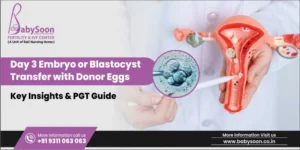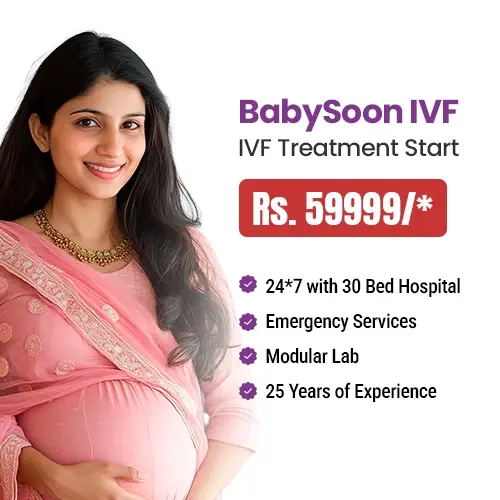Every week of pregnancy feels like a milestone for many couples undergoing IVF (In Vitro Fertilization). IVF is a more emotional and physically demanding process than natural conception. This makes patients more cautious and anxious about the safety of their pregnancy. A common question most patients ask is: After how many weeks is an IVF pregnancy considered safe? The answer can be attained by understanding the critical stages of pregnancy development and other factors. Having a trusted fertility specialist by your side makes all the difference in these times. Dr. Jyoti Bali is a renowned IVF specialist. Her dedicated dream at BabySoon Fertility and IVF Centre provides expert care and compassionate guidance. Meanwhile, this article shall help you find out when an IVF pregnancy can be considered safe.
Understanding IVF Pregnancy
An IVF pregnancy starts differently from natural conception. In this process, eggs are retrieved from the ovaries and fertilized in the laboratory. Then, these are carefully transferred into the uterus. The steps leading up to pregnancy differ in this case. Once the embryo successfully implants and develops, the pregnancy proceeds very similarly to a natural one. Nevertheless, medical control of such pregnancies should be tighter. This applies especially during the initial weeks. The stability of an IVF pregnancy is hugely contributed by factors such as hormonal support as well as implantation of the embryo, and the underlying health conditions. This is all the more cause for greater concern, and IVF patients need to be aware of each stage. They need to undergo frequent ultrasounds and blood tests as well.
Critical Stages Of IVF Pregnancy
Let us now have a look at the critical stage of IVF pregnancy:
First 2 Weeks After Embryo Transfer
This is the most delicate period. The embryo tries to attach itself firmly to the uterine lining during these two weeks. Several women experience mild cramping and spotting, as well as other symptoms. However, these are not always signs of success or failure. The pregnancy is mainly confirmed via a blood test for beta-hCG levels, around 10-14 days after the embryo transfer. This stage carries a great risk of chemical pregnancy. This is when implantation happens, but fails to progress any further.
Weeks 4–6
Weeks 4 – 6 is the period during which the pregnancy can be established in case of successful implantation by use of ultrasound. At week 6 of pregnancy, doctors are typically seeking the existence of a generational sac and, ideally, a fetal heartbeat. This is however a more vulnerable time which is prone to miscarriages and ectopic pregnancies. This is the reason why special attention should be paid at this moment.
Weeks 6–12 (First Trimester)
The first trimester is widely regarded as the most critical phase of pregnancy, whether it occurs naturally or through IVF. Most pregnancy losses typically happen before the 12th week. In IVF pregnancies, progesterone support is provided to help maintain the uterine lining and promote embryo growth. Once a fetal heartbeat is detected and continues to remain strong beyond 12 weeks, the pregnancy is generally considered stable and progressing well. How Many Weeks Does It Take To Consider An IVF Pregnancy Safe? An IVF pregnancy is generally considered safe after the completion of the first trimester. This marks the 12th to 13th weeks. The chances of miscarriage go down even more during this time. They fall well below 5%. At the time the pregnancy reaches the second trimester and the baby is growing normally, the pregnancy can be treated as if it were a natural conception. When one can hear the heart beating, and when the first trimester ends, that is when most couples begin feeling better and confident.
Factors That Influence Safety In IVF Pregnancies
The following factors influence safety in IVF pregnancies:
Maternal Age
Age is an important factor in fertility and pregnancy safety. Women above the age of 35 usually face higher risks of complications and miscarriage. This is true even with IVF. Younger women usually have higher chances of carrying safer pregnancies.
Embryo Quality
There is a higher chance of successful implantation of quality embryos that have been prepared with the help of advanced IVF procedures. It is they who attain healthy pregnancies. Embryo grading and genetic testing can assist in improving the outcomes.
Uterine Health
Implantation and the stability of pregnancy are dependent on the receptivity of the uterus. Disorders such as fibroids and endometriosis, and a thin endometrial lining, have the potential to compromise the safety of an IVF pregnancy.
Presence Of Multiple Pregnancies (Twins/Triplets)
There are some cases when IVF may result in multiple pregnancies. These have the potential to contribute towards preterm birth and gestational diabetes in addition to high blood pressure. Multiple pregnancies can be thrilling, yet they need closer attention to medical care.
Pre-existing Health Conditions
IVF pregnancies can be worsened by such health problems as thyroid imbalances and diabetes, as well as PCOS and hypertension. With the right management and medical care, many women are able to carry on with healthy pregnancies despite such conditions.
How To Ensure A Safer IVF Pregnancy
Here is how you can ensure a safer IVF pregnancy:
Following Doctor’s Guidelines
Each IVF journey and experience is unique. The advice given by your fertility specialist is personalized based on that. Following prescribed treatments and medications with lifestyle changes can greatly increase your chances of a safer pregnancy.
Regular Ultrasounds and Monitoring
In the first trimester, frequent check-ups and an ultrasound are significant. These assist the doctor in checking the development of the embryo. They will be able to monitor the heartbeat and diagnose possible risks in time.
Avoiding Risky Behaviours
It is important to avoid things like smoking and alcohol consumption, as well as self-medication during the process. You should seek the doctor’s approval even when consuming herbal or OTC supplements. At BabySoon Fertility & IVF Centre in Delhi, patients receive holistic guidance on what to do and what to avoid during this time. We help you enjoy a safer and more confident IVF journey.
Conclusion
IVF pregnancies are sensitive during the initial phases. Nonetheless, they tend to be safe weeks 12 – 13. It is at this point that the chances of miscarriage are reduced and the pregnancy will be able to develop to a healthy term. Couples seeking expert guidance on IVF pregnancy can benefit from Dr. Jyoti Bali’s expertise for individualized care. Her team at BabySoon Fertility Clinic helps patients begin their parenthood journey with confidence.






